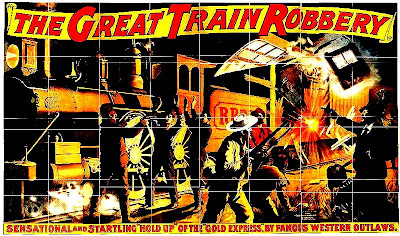 |
| A duck stealing money from a distracted woman's purse. Do you know what to call the criminal and the crime in this situation? If not, continue reading! (Image) |
CRIMINALS AND CRIMES
First of all, you can use the word "criminal" to describe any person who commits a crime. You can also call a criminal a delinquent, but that word isn't as common, and a delinquent often doesn't seem as serious as a criminal. Another common word for a person who steals or who is corrupt is crook. In each of the crimes we'll look at today, a criminal steals money or valuables (like jewelry, wallets, purses, or anything else that is expensive and valuable).
Let's look at some specific crimes:
ROBBERY
 |
| Criminals who commit robbery generally use weapons and force to get money or valuables. (Image) |
When one person robs another person, the name of the crime is robbery. The criminal is called a robber. When a robber commits robbery, he or she usually uses force, and often uses a weapon like a knife or a gun to convince the victim to surrender money or valuables. If a robber uses a weapon, the crime is often called armed robbery.
Sometimes robbers steal from their victims when they are walking down the street. If an armed robber forces a victim to give him money, then this crime is usually called a mugging. In this case, the robber is called a mugger, and he or she mugs the victim. The victim can say, "I got/was mugged!"
 |
| Muggings happen when criminals use weapons to force money from their victims. (Image) |
Finally, if a criminal runs past a victim and steals the victim's purse or bag, the crime is usually called purse snatching ("snatch" can mean "to take quickly"). In this case, the criminal is called a purse snatcher.
 |
| A very undramatic purse snatcher stealing a victim's purse. (Image) |
THEFT
 |
| People put locks on bikes to prevent theft. Unfortunately, many criminals carry saws or other tools to break the chains and locks. (Image) |
Theft is another crime, and the criminal who commits theft is called a thief (plural: thieves). Theft is a type of stealing, but it's a little different from robbery. Robbers usually confront their victims and use force to steal, but thieves normally take money or valuables when the victim is not present, or when the victim is distracted. In other words, victims of robbery definitely know the crime is happening, but victims of theft may not even notice that the crime is happening.
A common type of theft is pickpocketing. In this crime, a pickpocket steals a victim's wallet or other valuables from his or her pocket, purse, backpack, or bag ("to pick" can also mean "to take"). You can also say that a pickpocket picks a victim's pocket, even if it's a bag or purse. This crime is especially common in places with crowds (big groups of people) and on public transportation in some big cities.
 |
| A pickpocket stealing a victim's wallet. (Image) |
If a thief breaks into a house or car while the owner is gone, the crime is often called burglary and the criminal is a burglar. You can also call a burglar a "thief" or a "robber," too.
 |
| Many houses and businesses have burglar alarms to try to prevent burglary. (Image) |
OTHER TYPES OF STEALING
There are a few other types of stealing that are unfortunately fairly common. If a criminal steals a car that is unattended, it's called car theft. However, if the victim is driving the car, and the criminal forces the victim to surrender the car, the crime is called carjacking, and the criminal is a carjacker. If something similar happens on an airplane (which is certainly not as common, fortunately), it's called a hijacking.
In fact, it's not necessarily "correct" but in modern English, any time a criminal takes control of a vehicle or some kind of system, it's sometimes referred to as a "hijacking." For example, you may hear someone say, "Someone seems to have hijacked my bank account, because now I'm missing 500 dollars!"
If a criminal steals a person of any age, the criminal is a kidnapper and the crime is kidnapping. This is true even if the victim isn't a kid (child). You can also say the word "sequester," but it's definitely not as common, and it sounds more like a legal word than an everyday word.
Finally, if a criminal takes a victim's personal information and then impersonates the victim, the crime is called identity theft. Unfortunately, this seems to be becoming more common in some places.
So, that's a lot of vocabulary, right? If you have any questions or comments, I'd love to hear from you in the comments section.
Thanks for reading, and stay safe!













.jpg)
















